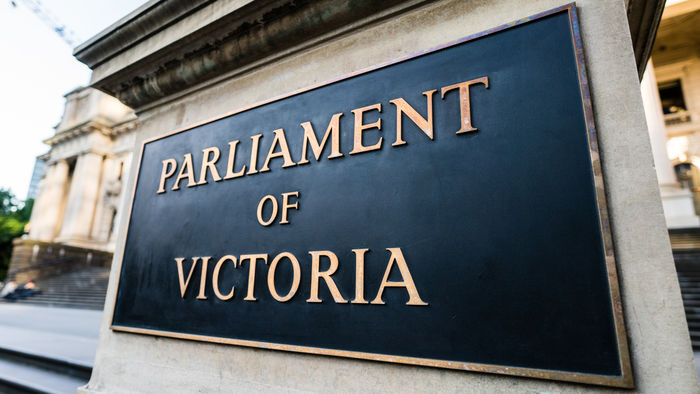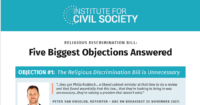Discrimination can be good or bad and lawful or unlawful. Victoria’s anti-discrimination laws start with broad rules that discrimination on certain grounds (e.g. sex, age, lawful sexual activity) is unlawful but then apply many “exceptions” so that good discrimination on those grounds is lawful. These “exceptions” protect other human rights and interests in society.
For example, the general rule against discrimination on the basis of age has multiple exceptions making it lawful e.g. to keep footballers over 18 out of the under-12s competition, to permit lower youth wages for people under 20 than adult wages. Despite the general rule against discrimination on the basis of political belief or activity, political parties can lawfully discriminate against an employee if the employee doesn’t stay in line with the political beliefs and activity of the party – it is hard to see how parties could maintain their policies otherwise.
Of the 45 exceptions in the Victorian law, two of them permit religious bodies and religious schools and colleges to lawfully discriminate in employment and other matters if their actions are in conformity with the doctrines, beliefs or principles of the religion. So a church or school or charity can make decisions about a member, employee or board member based on:
- whether the person’s religious beliefs and activities conform to the religion (that is lawful discrimination on the ground of religious)
- whether their conduct conforms to the conduct standards of the religion (accepting that no human is perfect and Christians should be showing grace, in practice the issue will be about continuing and repeated failures to comply with conduct standards).
The Victorian ALP Government has introduced the Equal Opportunity (Religious Exceptions) Amendment Bill 2021, to be debated from 16 November. It will severely restrict these 2 religion exceptions and hence the freedom of religious bodies, schools and charities to make decisions in conformity with the doctrines, beliefs or principles of the religion. The Bill creates 5 major restrictions on the freedoms of religious bodies, schools and charities.
Employment actions
- Employment actions of religious bodies and religious educational institutions in relation to a person are only protected when based on the person’s religious belief or activity, but not their conduct.
The Bill will permit religious bodies, education and charities take adverse employment action against an employee or contractor because of the religious belief or religious activity of the person does not conform to the religion, but not because their other conduct does not conform to the religion.
The government completely ignores the fact that all religions have conduct standards which believers are asked to comply with e.g. to care for the poor and the sick, to seek justice for all, to honour and care for their spouse and children and their parents when they are old, to avoid greed and lust and gambling, to only have sexual intercourse in man-woman marriage and abstain from sexual activity outside marriage, to be honest in business dealings and not exploit people, to be generous and a good steward.
Under the Bill religious bodies and religious education authorities cannot to take adverse employment action against an employee or contractor because the conduct of the person contravenes a moral conduct rule of the religion, if the person’s conduct falls within another protected attribute under the Equal Opportunity Act (e.g. marital status (includes de facto relationships), lawful sexual activity, or profession, occupation or trade (which will be added as a protected attribute by the Sex Work Decriminalisation Bill 2021 which has passed the lower house).
In effect, the Bill elevates secular progressive views of relationships, sexual activity and occupations over different religious views and prevents religious bodies and religious education authorities from applying their different religious views in employment actions.
Take some examples. A religious body or religious school or college or charity employs or contracts a person to work as a pastor or teacher or employee and later discovers that the person:
(a) has a (legal) second occupation which is contrary to the moral conduct rules of the religion (e.g. payday lending to people who can’t afford it, sharp business practice like aggressive debt collection, production or sale of legal pornography, sex work, providing services for a brothel, or for some religions, producing or selling pork for human consumption).
(b) is living in an unmarried de facto relationship (whether opposite sex or same sex) contrary to the moral conduct standards of the religion; or
(b) is engaging in any lawful sexual activity such as sexual relations outside marriage (whether opposite sex or same sex) including adultery or a serial one night stands contrary to the moral conduct standards of the religion.
If the person does not alter their conduct and the religious body or religious school or charity seeks to take adverse employment action against the person (e.g. demote them or reduce duties or hours or terminate them) because of (a), (b) or (c), that will be unlawful discrimination unless the body can show that it took the action because of the person’s religious belief or religious activity rather than their conduct. That will be very difficult to show in many cases because people may say they still hold the relevant belief, they just can’t live it out in their conduct in current circumstances.
There is a small safe harbour – the Bill’s restrictions will not apply to the ordination or appointment of priests, ministers of religion or members of a religious order; or the selection or appointment of people to perform functions in relation to any religious observance or practice. But the Bill will apply to any other employment action in relation to such positions apart from appointment and selection e.g. promotion, demotion, re-assignment, discipline or termination.
- Religious bodies and religious educational institutions can only take adverse employment action on the basis of a person’s religious belief or activity if it is an inherent requirement of the position that the person conform to the doctrines, principles or beliefs of the religion and the person cannot meet the inherent requirement because of their religious belief or activity
Whether any position has such an inherent requirement is determined by a tribunal or court, not by the religious body. It is to be determined based on the evidence of actual practice, not just by what the employment documents or code of conduct say.
Readers may be aware that the government and the Victorian Human Rights Commission (which handles discrimination complaints) favours the view that the positions of a minister of religion or the principal and religious studies teachers at a religious school will have such an inherent requirement, but probably not administration, maintenance, IT or accounts staff or the mathematics or English teacher. The Minister said in Parliament: “[I]f a teacher is never required to lead devotions, it is unlikely that the religious beliefs could be shown to be a genuine inherent requirement of their role. This highlights that inherent requirements must be assessed based on how the job is actually performed, rather than requirements which are simply asserted to be necessary.”
A preference for hiring a religious believer doesn’t create an inherent requirement
Some religious organisations have a policy of preferring to hire staff who share the beliefs and practices of the religion for a position where they can but accept that sometimes they cannot find such people in the labour market. The government has made clear that such a policy of preferencing will not make it an inherent requirement of the position that the occupant must conform to the doctrines, principles or beliefs of the religion. Quite the opposite – the fact that a non-believer (or a person of a different belief) might be or has been appointed to the position in the past suggests there is no inherent requirement.
Both of the above changes are a major interference by the State with the employment practices of religious bodies, schools and charities. They are discriminatory against religion, even hypocritical. The politicians and political parties are not imposing an inherent requirements test on their own ability to hire and fire staff based on how much they conform to the party’s political beliefs and activities. The burden is only for religious employers.
Balancing the competing interests
The argument in favour of these changes is that religious employers use the exceptions to discriminate against people living by different sexual and relationship standards than the religion’s conduct rules (a point especially made by LGBTI lobbyists). True enough that some religious employers do, but certainly not all.
But that is a consequence of freedom of association. Organisations formed to promote and model a way of life and a vision of the good need to hire staff who will be ambassadors for the cause, not staff whose conduct undermines modelling the vision and way of life of the organisation. Otherwise they will dilute and lose their organising purpose and ethos. That is why the Greens Party does not and should not have to hire or keep on staff people who march in pro-coal demonstrations. It is why LGBTI lobby organisations do not and should not have to hire or keep on staff those who argue on social media that all same sex attracted people should be celibate.
Balancing the competing interests by weighing the respective harms to the rights involved leads to the conclusion that the current exceptions should not be restricted further. An individual applicant or employee whose conduct contradict the doctrines, beliefs or practices of the religion of the religious employer will in almost all cases be able to find alternative employers where there is no such conflict. For example, a person whose application for a teaching position in a religious body or school is refused because the person’s conduct in sexual activity or relationship status or occupation contradicted the doctrines, beliefs or practices of the religion could move to any government school or a large number of independent schools and find that their conduct raised no concerns at all.
But if this Bill is adopted, the religious body or school cannot go elsewhere. Its ability to require that its ethos and values be modelled by its staff as expected by its other members, students and parents in these matters is denied by the State and, once compromised, cannot be recovered. For the same reasons if the Bill is adopted, the current option of parents to send their children to a religious body or school, all of the staff of which model and live out the values of the religion, is foreclosed by the State.
Non-Employment Actions
- Non-employment actions of religious schools and education institutions are restricted
The same restrictions on employment freedoms apply to religious bodies and religious education institutions but there are additional non-employment restrictions on religious educational institutions. They can only discriminate in relation to students or any other person (e.g. board members, school council members, parents, visitors) on the basis of the person’s religious belief or activity, not their conduct.
The Minister sets this out in her speech in Parliament (all references to schools should be taken to refer to all educational institutions and I have added some clarifications in square brackets):
This Bill will also prevent religious schools from discriminating in establishing, directing, controlling, or administering their institution on the basis of sex, sexual orientation, lawful sexual activity, marital status, parental status, or gender identity. They will be able to discriminate on the basis of a person’s religious belief or activities, if it is reasonable and proportionate to do so in all the circumstances.
These changes will mean, for example, that a religious school that holds specific beliefs about sex before marriage cannot expel [or take any other adverse action against] a student who [engages in any lawful sexual activity or] becomes pregnant only on the basis that the student [is engaging in the sexual activity or] is pregnant. Similarly, a religious school that holds specific beliefs about gender identity could not refuse to allow a transgender student to be on the student council [or take other adverse action against the student in relation to change rooms or dress codes] only on the basis that student is transgender. The school could only discriminate against these students if they held religious beliefs inconsistent with those of the school—and only take such discriminatory action as was reasonable and proportionate in all the circumstances.
The school would need to consider the student’s vulnerability as a child and the impact of the decision to discriminate on the student to determine what was reasonable and proportionate. And again, the school would need to ensure that the same action was taken against all students holding inconsistent religious beliefs, not only a student who is pregnant or transgender.
These changes will create significant difficulties for religious education institutions with religious beliefs on sexuality, sexuality relations, marriage and occupations (e.g. part time student jobs or other occupations of board members or councillors) which differ markedly from secular progressive views.
Those education institutions will only be able to take action in student enrolment and student conduct matters that would discriminate against a student on the basis of the student’s other occupation, lawful sexual activity, pregnancy, marital/de facto cohabitation status, sexual orientation or gender identity if the school can show that:
- the action is taken on the basis of the student’s religious belief or activity (not other conduct) and
- the action conforms with the doctrines, beliefs or principles of the religion or is reasonably necessary to avoid injury to the religious sensitivities of adherents of the religion in accordance with which the educational institution is conducted.
Of course, religious education institutions should be sensitive to the welfare and developmental stage of young people in taking such actions. But they will also need to be sensitive to the fact that many parents have chosen to send their children to the school (or adults have chosen to attend colleges) (usually making sacrifices to pay fees) precisely because of the education institution’s religious values to be reflected in its teaching and ethos including in its student conduct policies.
Again, the Bill elevates secular progressive views of relationships, sexual activity and occupations over different religious views.
If the Bill becomes law, it will be important for religious education institutions:
- to be clear and specific with their communities about their religious beliefs concerning matters like acceptable occupations (e.g. is there an issue with sex work, working for a bookie, selling or making pornography or violent or misogynist computer games or apps), lawful sexual activity, marital/de facto cohabitation status, and expressions of sexual orientation and gender identity;
- to determine if the basis for action is the student or other person’s religious belief or activity, not their other conduct – in some cases it may be reasonable to infer religious belief from conduct but in other cases the person may genuinely say they believe in but can’t comply with the religion’s conduct standards.
- Restriction on Religious Bodies which provide government funded goods and services
The Minister’s speech to Parliament says enough about this restriction:
The Bill will narrow the religious exceptions available to religious bodies which provide government funded goods and services. A religious body will only be able to discriminate in the provision of government funded goods and services on the basis of a person’s religious belief or activity, where it is reasonable and proportionate to discriminate in all the circumstances.
If the Victorian government were to provide the good or service directly, rather than through a religious body, the government would not be able to discriminate on any basis. The same limitations should apply where a religious body is providing the good or service on behalf of the government. For example, if a transgender teenager contacted a religious youth organisation that receives government funding to provide support to kids dealing with bullying, the organisation could not refuse to help the teenager just because they are transgender.
The government acknowledges that it is not aware of discrimination by religious providers in the provision of government funded goods and services. And, religious service providers generally do not discriminate in how they provide privately funded secular services, such as welfare and housing services. As such, the changes are not expected to have significant impacts for religious service providers. However, the changes have great symbolic importance and ensure government funding cannot be used in a discriminatory manner in the future.
- Any action proposed to be taken against a person under the above amended religious restrictions must be reasonable and proportionate based on the circumstances of the case.
Assuming all the above hoops have been jumped through and the religious body or education institution plans to take adverse action based on a person’s religious belief or activity, there is an entirely new super-added requirement not found in similar proposals by the ALP in 2010 and 2016, that the action must be reasonable and proportionate.
There is no justification provided for this additional hoop. It is only imposed on the religion exceptions, not for example on political parties taking action against staff whose political beliefs or activities no longer conform to the party’s.
This requirement creates a major headache entanglement of the State with religion – on what basis will a secular tribunal or court judge whether permitted action taken by a religious body or education institution on the basis of a person’s religious belief or activity or conduct is reasonable and proportionate? Reasonable by whose standards? And proportionate to what?
If a youth pastor in a religious body or teacher in a religious education institution has rejected a religious doctrine or has a porn addiction or moonlights as a sex worker, would a tribunal or court have to hear conflicting evidence to work out the level of seriousness of this in the eyes of a reasonable member of the religion to determine if the action taken by the religious body was reasonable and proportionate? Does proportionate mean proportionate to the harm to religious people’s sensitivities or to secular people’s sensitivities? Either way leads to a mess.
There are at least 45 sections providing for exceptions to the prohibition on discrimination in the Equal Opportunity Act. Some of them contain a reasonableness test (e.g. reasonable adjustments for disability) but most don’t, and none require that after showing the exception applies an employer or other person has the additional obligation of showing that their permitted action was reasonable and proportionate. So why single out religion for this super-added requirement?
The super-added requirement that any action taken must be reasonable and proportionate based on the circumstances of the case is unnecessary and will create many problems.
Conclusion
This Bill lacks an evidential foundation that there is a pressing problem it is trying to solve. It is hard to see it as other than an ideological attack on religious bodies, education institutions and people. Whether or not deliberately, it ignores the universal feature of religions that they have moral codes of conduct they expect their adherents and students to comply with. It strips religion down to belief plus religious observances and excludes actions and way of life. In the most severe example in current Australian law, it dictates to religious bodies and education institutions that they cannot apply some of the religion’s moral conduct standards in relation to their own employees or members or students and instead have to accept contrary secular conduct standards on pain of legal sanction. This is the State using anti-discrimination law to force secular terms of operation on religious bodies in the most naked form.
Mark Sneddon Executive Director
Institute for Civil Society www.i4cs.com.au








Recent Comments